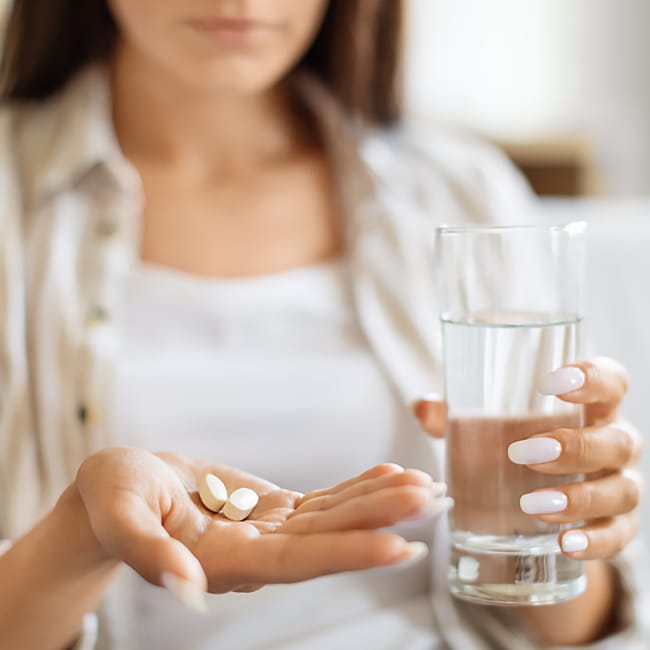This is an archived article and the information in the story may be outdated. Please check the time stamp on the story to see when it was updated last.
Bloating, unfortunately, is one of the most common digestive issues you can struggle with, causing distention and discomfort in the midsection after eating something that doesn’t agree with you. While not technically harmful, bloating and inflammation can be extremely unpleasant to deal with, especially as you work to pinpoint the cause and determine a solution moving forward. Sometimes it’s as simple as removing certain food items from your diet, but other times it can require a complete overhaul to your lifestyle to nip severe and chronic bloating in the bud.
Supplements are often included in diets in order to bridge the gap if you’re missing out on certain nutrients with the foods you eat, but believe it or not, certain supplements that claim to improve your overall health may actually be making bloating worse in the process. Depending on the state of your gut, there are a selection of supplements which could be worsening existing inflammation, and it might be worth eliminating them altogether as you work to improve your well being. Struggling with inflammation even after you’ve cleaned up your diet? Health experts say this one supplement could be to blame.


First and foremost it’s essential to determine the most common causes of bloating in order to truly repair your gut. “The two main reasons most familiar to people are: constipation and detoxification in the gastrointestinal tract that causes inflammation,” explains Caitlin Policastro, NP. Constipation is obviously the product of backed up waste in your system, while detoxification is less damaging to your body.
When you’re detoxifying your system, your body may retain bloat in order to fight off infection and promote healthy gut bacteria--this is not a form of bloat that you should be concerned about, although it is uncomfortable. However, when your gut is out of balance you may begin to take certain supplements, such as fiber and probiotics, in order to get things flowing again. Unfortunately, it’s these very supplements which may be causing inflammation.
Fiber and probiotics can be great for getting things moving and reducing constipation in the correct circumstances, but they can actually also inflict further inflammation on the body if you have a strong reaction to the introduction to new bacteria. Dysbiosis is known as an imbalance of the good and bad bacteria in your gut which is a common issue that causes bloating and discomfort, but may be treated by probiotics. However, in some cases it may make things worse. “When we initiate a drastic shift in our current gut bacteria, our body may not respond in the way we hope. With any supplement we're adding into our regimen, it's important to start slow and take note of our body's reaction,” explains Nicole Ritieni, RN.
“Though these supplements are typically beneficial to us, depending on one's specific situation they may shock the system and cause chaos in the microbiome leading to bloating,” she says. Particularly in the case of fiber pills, taking too much too soon can actually cause constipation and bloating as well, so easing into this particular supplement will likely warrant the best results.

If you are struggling with constipation due to these supplements, the first step would be to cut back on your daily dosage and check with your doctor to ensure it’s even necessary for you to be taking probiotics or fiber supplements. If the problem persists and inflammation does not abate, it can be helpful to consume a colorful diet of fruits and vegetables to naturally get things moving.
Increasing your water intake as well is another simple trick for flushing out bloat, increasing digestion so you can feel more comfortable in your body. “In addition, supplements like Magnesium and Vitamin C will help with peristalsis of the intestinal tract and alleviate constipation,” notes Policastro. Whole grain carbs can also provide natural fiber which will reduce inflammation over time, without relying on a supplement.
Bloating may be a common digestive issue, but that doesn’t mean you should have to sit back and suffer through the discomfort that accompanies it. Reducing your intake of fiber supplements and probiotics unless strictly recommended to you by your doctor is a great first step for minimizing inflammation and beating bloat at the source, and maintaining a nutrient dense diet is another excellent option for keeping your digestion regular.
Supplements can make a great addition to your routine if you are deficient in certain nutrients, but adding them in for the sake of it can often do more damage than good in the grand scheme of things. While there is a time and a place for probiotics, if you’re struggling with bloating consistently, it may be worth removing them from your diet.


























